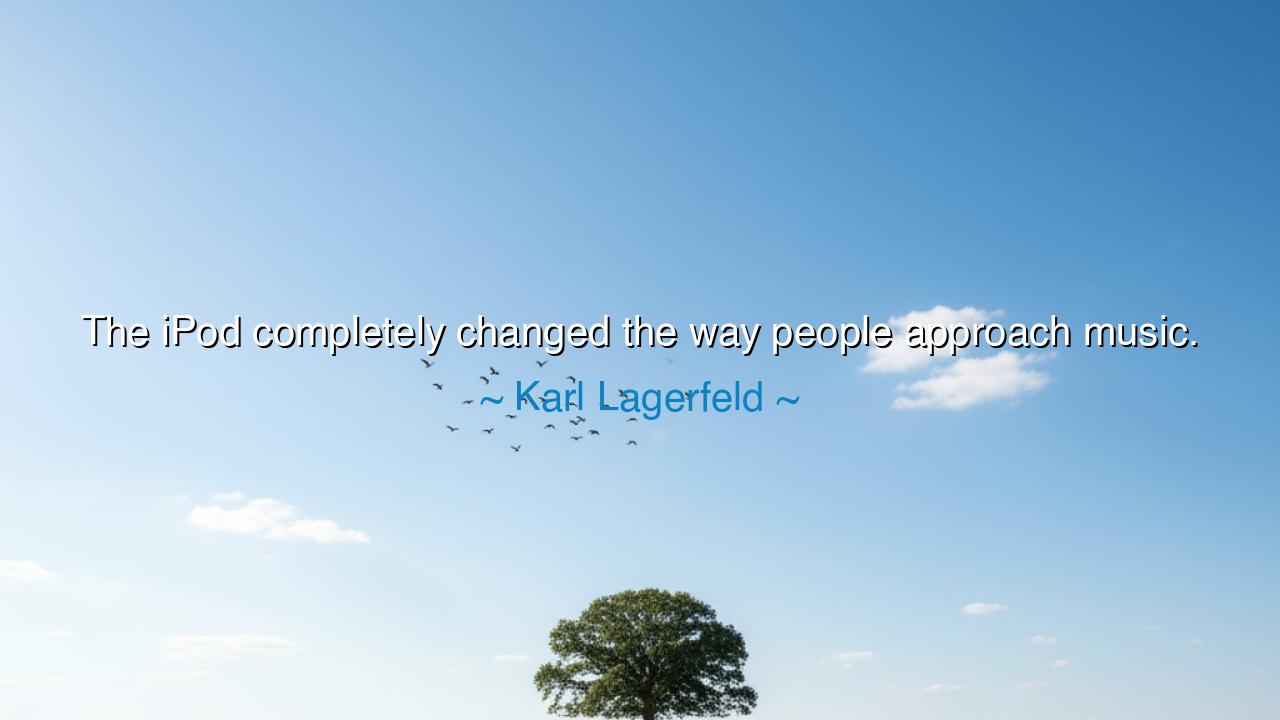
The iPod completely changed the way people approach music.






Karl Lagerfeld, the oracle of fashion and culture, once observed with striking clarity: “The iPod completely changed the way people approach music.” In this statement, he was not merely commenting on a device of technology, but on a revolution in human experience. For the iPod was not a simple machine—it was a gateway that altered the relationship between man and melody, between listener and song, between the private soul and the vast archive of sound.
To say it changed the way people approach music is to recognize how deeply it reshaped not only habits, but consciousness itself. Before its arrival, music was bound to the physical world: records spun on turntables, cassettes wound on reels, compact discs gleamed in their cases. One carried only a handful of songs at a time, tied to heavy objects. But the iPod shattered those chains. It placed thousands of songs within the palm of the hand, allowing the listener to summon entire worlds of sound at will. For the first time, music became as mobile as thought itself.
The iPod created an intimacy with music unknown to earlier ages. A listener could walk through crowded streets, yet dwell in their own cathedral of sound. They could run across fields, sit upon trains, or wait in silence, all while carrying symphonies, ballads, and anthems within a pocket. It was as if each individual had gained their own personal orchestra, always waiting, always ready to play. This private union between man and song altered the way music was consumed, cherished, and shared.
Consider the cultural ripple of this invention. Just as the printing press democratized knowledge by placing books in the hands of common men, so too did the iPod democratize music, giving to the many what had once been the privilege of the few. With it, no one needed a vast library of discs, no grand stereo system, no costly shelves of records. Anyone could carry the treasury of human song wherever they went. In this sense, the iPod was not merely a device but a great equalizer, making music as accessible as the air.
And yet, its influence was not only practical, but philosophical. The iPod taught us that choice itself would shape our relationship with art. With thousands of songs available, listeners created playlists that reflected their souls, weaving fragments of genres, eras, and moods into personal narratives. Music became not just something received, but something curated, shaped, and arranged by the listener. This act transformed the audience into a kind of co-creator, blurring the line between consumption and artistry.
But as with all revolutions, there were shadows. In making music so abundant, the iPod also risked making it disposable. Where once a listener sat with a single album, playing it over and over until its depths were revealed, now one might skip endlessly, never dwelling long enough to find the soul of a song. Here lies the double-edged nature of change: abundance can enrich, but it can also distract. Lagerfeld’s words remind us to be mindful of both the gift and the danger.
The lesson, then, is this: embrace innovation, but do not lose reverence. Carry music with you, let it shape your journeys and your days, but do not treat it as mere background noise. Remember that each song is a labor of heart and spirit, and deserves your full attention. Use technology not to diminish art, but to deepen your encounter with it.
So, O children of tomorrow, take Karl Lagerfeld’s wisdom as a guide. Recognize that tools like the iPod may change how you approach music, but it is you who must decide how deeply you listen. Let not abundance dull your wonder, nor convenience rob you of meaning. For in the end, technology may carry the songs, but only your heart can give them life.
Thus remember always: the iPod changed the way—but you must preserve the why. Music is not merely to be carried; it is to be cherished, to be entered into, to be lived.






AAdministratorAdministrator
Welcome, honored guests. Please leave a comment, we will respond soon